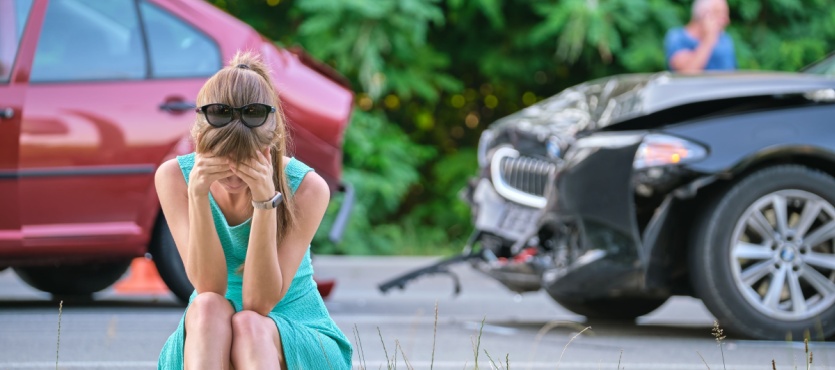Car accidents can be frustrating to deal with. Not only is there physical damage to deal with, but there may be injuries as well. And the injuries may not be solely physical in nature. They can also be emotional or mental, which can be hard for many people to deal with.
Sometimes mental trauma after a car crash can be severe, and it can be hard for victims to get the treatment they need. Some people may develop a little stress and anxiety when getting into a car after an accident. Others may develop full-blown post-traumatic stress disorder (PTSD). PTSD occurs when a person experiences or witnesses a traumatic event.
PTSD is often associated with veterans who have been in war, but anyone who has experienced trauma can be a victim, and car accidents are no exception. PTSD can last for months or even years. Symptoms include the following:
- Intrusive memories. PTSD victims may constantly relive the car accident and experience recurring memories. The memories may be so bad that they experience severe distress or a physical response when reminded of the accident.
- Changes in mood and thought. Victims may think negatively about themselves and experience memory problems. They may have difficulty maintaining relationships and feel hopeless about the future. They may also lose interest in activities they once enjoyed.
- Changes to physical or emotional reactions. Many people with PTSD are frightened easily. This can cause them to experience difficulty sleeping or concentrating. They may also feel guilty or ashamed. Some engage in alcohol or drug use.
- Avoidance. Those suffering from PTSD will often try to avoid anything that reminds them of the event, so it may be hard for them to even discuss the details of the car accident.
Dealing With Anxiety
It is normal to be a little anxious after getting into an accident, but when the problem is long-term and affects your ability to drive or even ride in a vehicle, it is time to take action. Seeking professional help is a good first step. Discussing your fears with a licensed therapist can help you better understand when and why you feel a certain way. Certain therapies, such as cognitive therapy and exposure therapy, can help you recognize patterns and triggers and help you move forward. Certain medications, such as antidepressants and anti-anxiety medications, can help you feel happier and less anxious.
Here are some other things you can do:
- Seek medical attention. Anxiety can sometimes be caused by a physical condition. You should see a doctor to rule out any medical conditions. Addressing them can make you less anxious.
- Talk to someone. Share your experience with friends or family. As mentioned above, a therapist can also be helpful. Talking about the accident can help you process what happened.
- Limit exposure to triggers. If driving or being in a car causes too much anxiety, take gradual steps to reintroduce yourself to your vehicle. Start with short drives and slowly build up your confidence. Even sitting in your vehicle, going through the controls, and listening to music can help you feel more relaxed.
- Try relaxation techniques. Practice diaphragmatic breathing to calm your nervous system. Mindfulness and meditation can help you stay grounded and reduce anxiety.
- Maintain a healthy lifestyle. Ensure you get adequate sleep, eat a balanced diet, and stay hydrated. Engage in regular physical activity. Walking, yoga, or swimming can help reduce anxiety.
- Maintain a routine. Keeping a regular daily schedule can provide a sense of normalcy and control.
- Limit stimulants. Reduce caffeine and sugar intake as they can exacerbate anxiety symptoms.
- There’s an app for that. There are various apps designed to help manage anxiety through guided meditations and breathing exercises.
Avoid Car Accidents
The best thing you can do to alleviate your fears after an accident is to avoid a subsequent crash. Here are some tips to stay safe once you’re back behind the wheel:
- Obey traffic signals. Always stop at red lights and stop signs. Do not be tempted to speed up at yellow lights and drive straight through stop signs. Be sure to follow traffic signs and signals at all times, even when you are the only vehicle around.
- Don’t speed. Speeding is a factor in roughly one-third of all fatal car accidents. Driving too fast makes it harder to stay in control. Plus, it takes longer to brake, which can increase the risk of a crash. Keep it under the speed limit.
- Avoid rush hour. Avoid difficult driving situations such as rush hour. Driving during the rush hour commute means stop-and-go traffic, which increases the risk of an accident.
- Avoid distractions. Distracted driving is one of the leading causes of car accidents. Avoid activities that take your eyes off the road and your hands off the wheel, such as texting, phone calls, eating, drinking, and grooming.
- Always wear your seatbelt. While seat belts do not prevent accidents, they do prevent serious injuries and can even save your life. Most people who die in car crashes were not wearing a seatbelt.
Contact Us Today
Car accidents are often associated with physical injuries, but victims can suffer from extreme mental trauma as well. It is important to get proper treatment and compensation for this harm.
A car accident lawyer at Brill & Rinaldi, The Law Firm, can help you receive compensation for your mental trauma following a crash. This is not an easy task, as there are complexities involved with Florida being a no-fault state. We have the experience and dedication you need. To schedule a free consultation, fill out the online form or call (954) 876-4344. We have offices in Weston, Coral Gables, and Daytona Beach.

